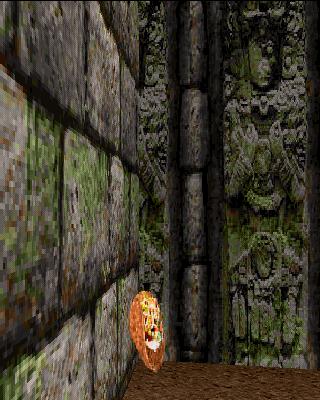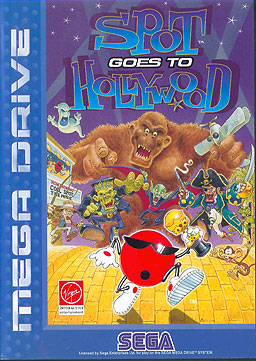Brands
The 11 Weirdest Branded Video Games
A couple weeks ago, Warby Parker, the trendy glasses startup, announced its first video game: Worbs.
Made in collaboration with gaming magazine Kill Screen, Worbs is a simple in-browser matching game good for helping you kill five minutes. It doesn’t make much sense—what does matching circles have to do with glasses? Still, it was a relatively innocuous way to promote the Kill Screen-branded glasses Warby Parker had created.
It’s hard to say the same for these 11 games. Ever since the dawn of the video game industry, brands have developed so-called “advergames,” or games meant to promote a product. Not surprisingly, many of them have been bad. Even less surprisingly, almost all of them have been weird. Here are the 11 weirdest of all.
1. Axe: Mojo Master (2005)
A lot has changed since the mid-2000s.
We all have smartphones. Donald Trump has moved from starring in reality TV to making for some very, very real TV. And this Axe body spray video game, a “seduction” game in which the player is meant to bag “prizes” like 2005 Playboy Playmate of the Year Tiffany Fallon, would definitely not fly.
The description of Mojo Master on video game website IGN reads like a wannabe pickup artist’s (or “PUA,” as it’s known in the community) perfect game:
Many faces have been slapped, many drinks dumped on heads, and many relationships ruined in the name of Mojo Master—WildTangent’s free fantasy game of seduction. Countless hours have been logged observing social encounters, attempting to better understand the female species, and determining what makes a playa a playa. These laborious studies have given birth to seduction theories that have been applied to a virtual construct, a game that lets you let loose in a fantasy world populated by 100 totally hot 3D girls. Each unique girl is derived from a personality matrix called The Seduction Compass. You’ll be armed with hundreds of over-the-top moves that could either boost your game with a girl or get you slapped, depending on how well you understand the Compass. Be one with the Seduction Compass, build a solid repertoire of moves, win over all 100 girls, and you will be The Mojo Master.
There was even a multiplayer component labeled—I kid you not—”Playa versus Playa,” according to Unilever’s press release announcing the game. It was meant to simulate how, “just like in real life, you’ll have to compete against a buddy for the attention and affection of a lady of your choosing.” Nice.
For what it’s worth, Axe just recently signaled it will move beyond its machismo, often outright misogynist branding for something a little more wholesome. Its most recent ad campaign features more realistic dudes, and asks men to “Find Your Magic”—i.e., whatever makes you attractive.
It may not make up for the dozens of Axe bombs that happened in my high school, but it’s a start.
2. Chex Mix: Chex Quest (1996)
Believe it or not, Chex Quest, a conversion of ultra-violent first-person shooter Doom that was distributed via cereal box, has something of a cult following. Evan Lahti of PC Gamer called it the “most successful advergame ever”; there is an active forum of Chex Quest fanatics; and the game’s artistic director, Charles Jacobi, is working on an HD remake.
So what do you do in Chex Quest, this most glorious of branded games? You shoot gooey slime things called Flemoids with your Zorcher, of course. Except you’re not actually shooting things, you’re “transporting” them elsewhere. (As a branded product, Chex Mix had to avoid promoting murder, even against Flemoids.)
The best part? Your melee weapon is a spork.
3. Pepsi: Pepsiman (1999)
Unfortunately for American advergame enthusiasts, this Pepsi-branded Playstation 1 game was only released in Japan. It stars the titular “Pepsiman,” Pepsi’s skin-suit-wearing, no-face-having Japanese mascot.
The game plays a lot like Temple Run, the absurdly popular series for iOS: You automatically run forward, try to collect Pepsi cans, and avoid obstacles. There’s Pepsi branding everywhere, including filmed scenes of an overweight man drinking Pepsi in various spots around his home.
My favorite part of Pepsiman, though, is this delightfully weird “speed-run” embedded above, in which a player clad in a Pepsiman suit attempts to beat the game as quickly as possible. Well, second-favorite part. I don’t know if anything can beat the triumphant “Pepsimannnn” chant that happens every few minutes of gameplay.
4. Burger King: Sneak King (2006)
As if Burger King’s mascot wasn’t creepy enough, Burger King decided it was a good idea to create a game in which you sneak up on unsuspecting people as “The King” to feed them Whoppers.
Sneak King was part of a trilogy of games distributed with value meals. The other two—Pocketbike Racer, in which you race on mini-motorcycles, and Big Bumpin’, in which you pilot a bumper car—were decidedly more tame.
Of the three, however, only Sneak King was under the creative control of Burger King. The other two were designed, at least in part, by Blitz Games, according to a Gamasutra interview with lead designer Philip Oliver.
So, yes, Sneak King was purely the idea of Burger King’s advertising executives. I honestly don’t know what to make of that, but judging by the multiple videos of Sneak King gameplay with millions of views, they may be geniuses.
5. Taco Bell: Taco Bell Tasty Temple Challenge (2000)
Speaking of fast-food chains that target stoned teenagers, here’s Taco Bell’s Taco Bell Tasty Temple Challenge. There are many weird things about this game. You’re in a temple for some reason (Mexico, I guess?), you shoot hot sauce to kill snakes and scorpions, and you eat Chulupas to restore your health.

Source: Moby Games
The weirdest part, however, is that Taco Bell Tasty Temple Challenge was released for MS-DOS, a 19-year-old operating system at the time. (In fact, it was one of the first operating systems ever.) Sure, the final version of MS-DOS came out in 2000 (when the game was released), but by that time only the most hardcore of hardcore computer nerds were using it. Not great planning there, Taco Bell.
And yes, that video I embedded above is from a channel that is dedicated to playing advergames. The internet is a wild and wonderful place.
6. 7 Up: Spot Goes to Hollywood (1995)
For some reason, almost every advergame ever made seems to be related to food or drink. I guess there’s quite a bit of overlap between gamers and those who binge on unhealthy food.
7 Up was one of the early pioneers when it came to advergames. The first game in the Spot series—Cool Spot, which stars the soda brand’s mascot—was released in 1993 on the Super Nintendo Entertainment System (SNES) and managed to create a decent following. It currently holds a 7.7 player rating on GameSpot and a perfect five-star rating on Amazon.
I picked its sequel for this list purely because of the cover:

Source: Wikipedia
7. Uber: Uber Drive (2015)
The most recent game on this list is Uber Drive, though calling it a game may be something of a stretch. Your goal is to figure out the fastest, safest route from point A to point B on a Google Map. Basically, be an Uber driver without the actual driving part. Fun!
As The Verge reports, the game was a side project of an Uber employee and is meant purely as a recruitment tool. You can upload your information into the app to be approved as a driver, and pop-ups help educate you on various points of interest.
The weird part here is I’ve never seen an Uber driver not use automated GPS directions. In other words, the game is based around a mechanic that is entirely outdated. But since it was a side-project of an employee, Uber had nothing to lose by releasing the game (except, maybe, being included on this list).
8. Skittles: Darkened Skye (2008)
At first glance, Darkened Skye seems like your typical “save the world” fantasy game. For the most part, it is. There are five different environments (forest, island, mountain, etc.), you’re fighting the “forces of darkness,” and the trailer for the game includes the amazingly cheesy tagline “In a world where magic sleeps, she is the wake-up call.”
The strange part is the magic comes from Skittles. As you can see in the video below, it’s only when the main character finds a glowing Skittle that she gains her magical powers.
From there, you have to collect more Skittles to keep your magic bar filled. And that’s pretty much it for the branding.
As you might expect, the game has a bizarre development story. Published by Simon & Schuster’s short-lived gaming brand, the game was created after the success of M&M’s licensed games and written by young adult fiction author Elizabeth Braswell. Apparently, Simon & Schuster considered removing all the Skittles branding right before the game’s release, but decided not to after it realized how intertwined the branding was with the script and gameplay.
9. Cheetos: Chester Cheetah: Wild Wild Quest (1993)
Next on the list of unhealthy-food-related games with patently ’90s “cool” mascots, there’s Cheetos’ Chester Cheetah: Wild Wild Quest. The game is a poor copy of Sonic the Hedgehog, with Chester dying in one hit unless you have a bag of Cheetos, spinning his legs to power up his running, and jumping on top of enemies’ heads to kill them.
The difference here is you’re a super cool cheetah who travels around the U.S. on his super cool Harley, rather than a super cool hedgehog. It is also brutally hard, according to the YouTuber who made the above video, who describes it as having a “Draconian level of difficulty.”
I’m including this one over the original Chester Cheetah game, Too Cool to Fool, purely because of that beautiful pun in the title.
10. California Raisins Advisory Board: The California Raisins: The Grape Escape (1990)
This game, built as the video game extension of The California Raisins’ media empire, was actually canceled before it was ever released. But I’m including it anyway, just because I find it hilarious that an advertising campaign by a marketing commission trying to sell California raisins got this far.
For those who don’t remember, The California Raisins began with a wildly popular commercial in which four raisins sing Marvin Gaye’s classic song “Heard It Through the Grape Vine.”
From there, it spun out to multiple primetime TV specials, four records, tons of merchandise, and this ill-fated video game, developed by gaming big-shot Capcom.
The game apparently played a lot like Capcom’s other classics Mega Man and DuckTales, except you could moonwalk by pressing Select. That makes for an automatic buy, if you ask me.
11. Hooters: Hooters Road Trip (2002)
Hooters Road Trip is really a perfect amalgamation of everything else on this list: the male gaze, unhealthy food brands, and mediocre gaming.
In the game, you drive through different southern cities (seriously, there is nothing above Raleigh, North Carolina, on the map) while shred rock and honky-tonk blares. When you reach a city, a five-second clip plays of a Hooters girl welcoming you. After about an hour and a half of this, you beat the game and are rewarded with this beautifully edited clip of girls going, “Woo!”
Well deserved.
Get better at your job right now.
Read our monthly newsletter to master content marketing. It’s made for marketers, creators, and everyone in between.




